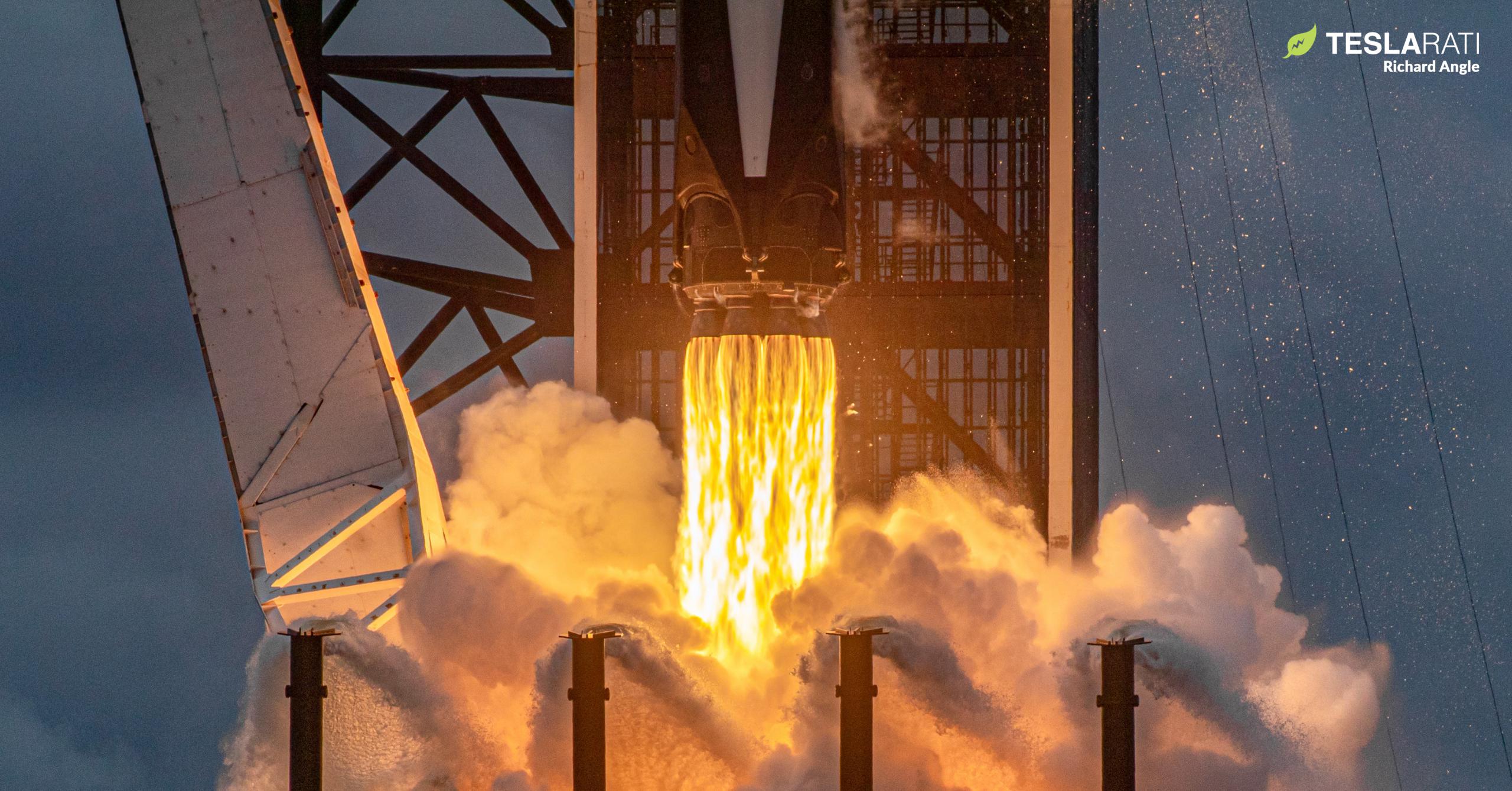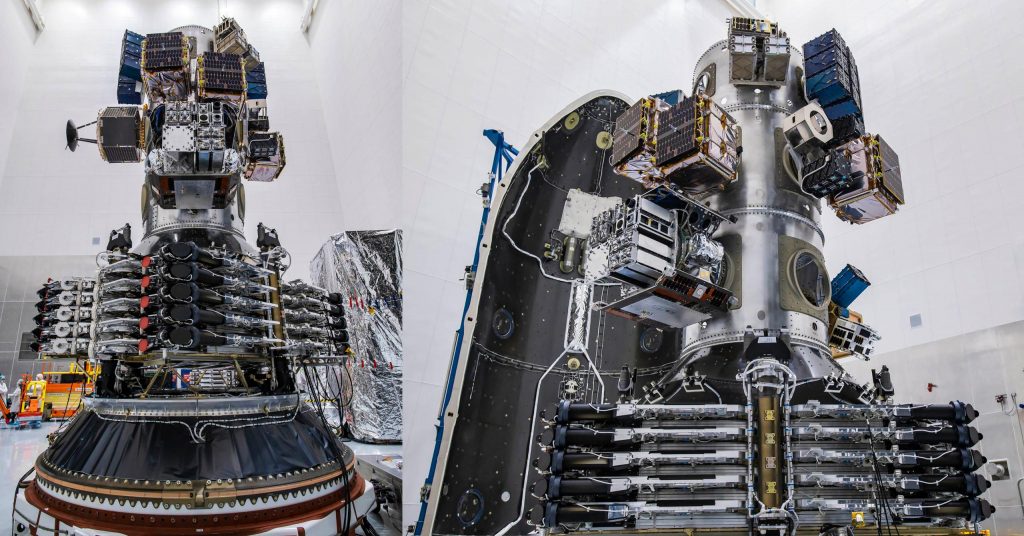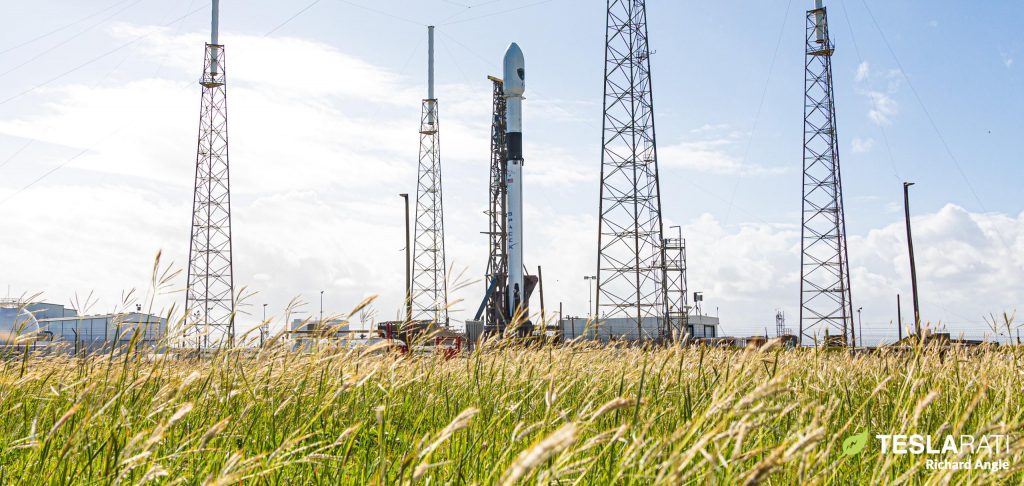

News
SpaceX on track to launch 20 Falcon 9 rockets in the first half of 2021
The second half of SpaceX’s June 2021 flight schedule has begun to firm up, raising the odds of another four-launch month as the end of the first half of 2021 fast approaches.
In an increasing rarity among a slew of pandemic and shortage-stricken satellites, rockets, and launch flows, SpaceX’s fourth upgraded GPS III satellite launch for the US military has remained on track for more than four months and has had a firm launch date for more than eight weeks. Further, the GPS III SV05 navigation satellite’s launch schedule actually moved up from July 2021 and has been scheduled to launch no earlier than June 17th, 2021 since mid-April. The only noteworthy change made in the subsequent two months was a minor shift in launch time, which was moved from 6-9 pm EDT to a 15-minute window stretching from 12:09 pm to 12:24 pm (16:09-16:24 UTC).
More recently, Spaceflight Now was first to report that Transporter-2 – SpaceX’s second dedicated Smallsat Program mission and fourth June 2021 launch – settled on a launch target sometime during daylight on June 24th. A large portion of rideshare payload integration – assembling a massive ‘stack’ of dozens of satellites and dispensers – has already been completed, improving the odds that Transporter-2 will launch on schedule.
As was SpaceX’s main intent with its Smallsat Program, the company effectively closes the metaphorical doors on a given Transporter mission around a week before launch. From then on, if issues arise with any minor integrated rideshare payload or something delays a planned payload from being integrated in time, the customer is more or less automatically rebooked on SpaceX’s next Transporter mission. That means that delays or pre-launch anomalies that inevitably impact a small fraction of a dedicated rideshare mission’s total payloads don’t end up delaying dozens to 100+ other spacecraft.
Crucially, for the unlucky few customers that find themselves essentially booted off the bus, SpaceX nominally rebooks them at no extra charge on the next Transporter mission. While the program is only just beginning, SpaceX has already scheduled four dedicated Transporter launches between January 2021 and Q1 2022, meaning that payloads unable to launch on their scheduled flight will have to wait approximately six months for the next launch opportunity. While undoubtedly more than a little inconvenient, SpaceX is effectively betting that customers are willing to trade some degree of flexibility for low prices and launch dates firmly scheduled months in advance.
So far, that bet has unequivocally paid off and SpaceX has secured contracts to launch hundreds of rideshare payloads in just a few years.

Meanwhile, SpaceX’s June 17th GPS III SV05 mission will be the first time ever that the US military launches a “national security” payload on a flight-proven commercial rocket. Falcon 9 booster B1062 debuted with the successful launch of GPS III SV04 in November 2020. Seven months later, GPS III SV05 will be its second launch. If successful, it’s likely that the US military will allow SpaceX to use Falcon 9 B1062 a third time to launch GPS III SV06 – tentatively scheduled sometime in Q4 2021 or early 2022.

If both GPS III SV05 and Transporter-2 missions are successful, June 2021 will be SpaceX’s third four-launch month ever, representing an average of 48 launches per year if sustained for 12 months. All four June launches are also for paying customers, bringing welcome revenue to an H1 2021 manifest that’s been almost entirely populated by internal Starlink missions. Perhaps most significantly, a four-launch June will also mark 20 orbital SpaceX launches in the first half of 2021, leaving the company on track to achieve 40 launches this year if it can replicate that success in the second half.
News
Tesla UK sales see 14% year-over-year rebound in June: SMMT data
The SMMT stated that Tesla sales grew 14% year-over-year to 7,719 units in June 2025.

Tesla’s sales in the United Kingdom rose in June, climbing 14% year-over-year to 7,719 units, as per data from the Society of Motor Manufacturers and Traders (SMMT). The spike in the company’s sales coincided with the first deliveries of the updated Model Y last month.
Model Y deliveries support Tesla’s UK recovery
Tesla’s June performance marked one of its strongest months in the UK so far this year, with new Model Y deliveries contributing significantly to the company’s momentum.
While the SMMT listed Tesla with 7,719 deliveries in June, independent data from New AutoMotive suggested that the electric vehicle maker registered 7,891 units during the month instead. However, year-to-date figures for Tesla remain 2% down compared to 2024, as per a report from Reuters.
While Tesla made a strong showing in June, rivals are also growing. Chinese automaker BYD saw UK sales rise nearly fourfold to 2,498 units, while Ford posted the highest EV growth among major automakers, with a more than fourfold increase in the first half of 2025.
Overall, the UK’s battery electric vehicle (BEV) demand surged 39% to to 47,354 units last month, helping push total new car sales in the UK to 191,316 units, up 6.7% from the same period in 2024.
EV adoption accelerates, but concerns linger
June marked the best month for UK car sales since 2019, though the SMMT cautioned that growth in the electric vehicle sector remains heavily dependent on discounting and support programs. Still, one in four new vehicle buyers in June chose a battery electric vehicle.
SMMT Chief Executive Mike Hawes noted that despite strong BEV demand, sales levels are still below regulatory targets. “Further growth in sales, and the sector will rely on increased and improved charging facilities to boost mainstream electric vehicle adoption,” Hawes stated.
Also taking effect this week was a new US-UK trade deal, which lowers tariffs on UK car exports to the United States from 27.5% to 10%. The agreement could benefit UK-based EV producers aiming to expand across the country.
News
Tesla Model 3 ranks as the safest new car in Europe for 2025, per Euro NCAP tests
Despite being on the market longer than many of its rivals, the Tesla Model 3 continues to set the bar for vehicle safety.

The Tesla Model 3 has been named the safest new car on sale in 2025, according to the latest results from the Euro NCAP. Among 20 newly tested vehicles, the Model 3 emerged at the top of the list, scoring an impressive 359 out of 400 possible points across all major safety categories.
Tesla Model 3’s safety systems
Despite being on the market longer than many of its rivals, the Tesla Model 3 continues to set the bar for vehicle safety. Under Euro NCAP’s stricter 2025 testing protocols, the electric sedan earned 90% for adult occupant protection, 93% for child occupant protection, 89% for pedestrian protection, and 87% for its Safety Assist systems.
The updated Model 3 received particular praise for its advanced driver assistance features, including Tesla’s autonomous emergency braking (AEB) system, which performed well across various test scenarios. Its Intelligent Speed Assistance and child presence detection system were cited as noteworthy features as well, as per a WhatCar report.
Other notable safety features include the Model 3’s pedestrian-friendly pop-up hood and robust crash protection for both front and side collisions. Euro NCAP also highlighted the Model 3’s ability to detect vulnerable road users during complex maneuvers, such as turning across oncoming traffic.
Euro NCAP’s Autopilot caution
While the Model 3’s safety scores were impressive across the board, Euro NCAP did raise concerns about driver expectations of Tesla’s Autopilot system. The organization warned that some owners may overestimate the system’s capabilities, potentially leading to misuse or inattention behind the wheel. Even so, the Model 3 remained the highest-scoring vehicle tested under Euro NCAP’s updated criteria this year.
The Euro NCAP’s concerns are also quite interesting because Tesla’s Full Self-Driving (FSD) Supervised, which is arguably the company’s most robust safety suite, is not allowed for public rollout in Europe yet. FSD Supervised would allow the Model 3 to navigate inner city streets with only minimal human supervision.
Other top scorers included the Volkswagen ID.7, Polestar 3, and Geely EX5, but none matched the Model 3’s total score or consistency across categories. A total of 14 out of 20 newly tested cars earned five stars, while several models, including the Kia EV3, MG ZS, and Renault 5, fell short of the top rating.
Elon Musk
Why Tesla’s Q3 could be one of its biggest quarters in history
Tesla could stand to benefit from the removal of the $7,500 EV tax credit at the end of Q3.

Tesla has gotten off to a slow start in 2025, as the first half of the year has not been one to remember from a delivery perspective.
However, Q3 could end up being one of the best the company has had in history, with the United States potentially being a major contributor to what might reverse a slow start to the year.
Earlier today, the United States’ House of Representatives officially passed President Trump’s “Big Beautiful Bill,” after it made its way through the Senate earlier this week. The bill will head to President Trump, as he looks to sign it before his July 4 deadline.
The Bill will effectively bring closure to the $7,500 EV tax credit, which will end on September 30, 2025. This means, over the next three months in the United States, those who are looking to buy an EV will have their last chance to take advantage of the credit. EVs will then be, for most people, $7,500 more expensive, in essence.
The tax credit is available to any single filer who makes under $150,000 per year, $225,000 a year to a head of household, and $300,000 to couples filing jointly.
Ending the tax credit was expected with the Trump administration, as his policies have leaned significantly toward reliance on fossil fuels, ending what he calls an “EV mandate.” He has used this phrase several times in disagreements with Tesla CEO Elon Musk.
Nevertheless, those who have been on the fence about buying a Tesla, or any EV, for that matter, will have some decisions to make in the next three months. While all companies will stand to benefit from this time crunch, Tesla could be the true winner because of its sheer volume.
If things are done correctly, meaning if Tesla can also offer incentives like 0% APR, special pricing on leasing or financing, or other advantages (like free Red, White, and Blue for a short period of time in celebration of Independence Day), it could see some real volume in sales this quarter.
You can now buy a Tesla in Red, White, and Blue for free until July 14 https://t.co/iAwhaRFOH0
— TESLARATI (@Teslarati) July 3, 2025
Tesla is just a shade under 721,000 deliveries for the year, so it’s on pace for roughly 1.4 million for 2025. This would be a decrease from the 1.8 million cars it delivered in each of the last two years. Traditionally, the second half of the year has produced Tesla’s strongest quarters. Its top three quarters in terms of deliveries are Q4 2024 with 495,570 vehicles, Q4 2023 with 484,507 vehicles, and Q3 2024 with 462,890 vehicles.
-

 Elon Musk4 days ago
Elon Musk4 days agoTesla investors will be shocked by Jim Cramer’s latest assessment
-

 News1 week ago
News1 week agoTesla Robotaxi’s biggest challenge seems to be this one thing
-

 Elon Musk2 weeks ago
Elon Musk2 weeks agoFirst Look at Tesla’s Robotaxi App: features, design, and more
-

 News2 weeks ago
News2 weeks agoSpaceX and Elon Musk share insights on Starship Ship 36’s RUD
-

 News2 weeks ago
News2 weeks agoWatch Tesla’s first driverless public Robotaxi rides in Texas
-

 News1 week ago
News1 week agoWatch the first true Tesla Robotaxi intervention by safety monitor
-

 News2 weeks ago
News2 weeks agoTesla has started rolling out initial round of Robotaxi invites
-

 Elon Musk2 weeks ago
Elon Musk2 weeks agoTesla to launch in India in July with vehicles already arriving: report


















